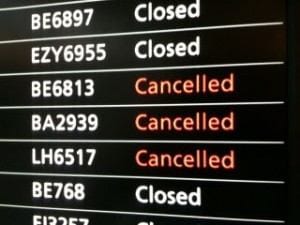Anyone who travels for work or for pleasure doesn’t just need to know how to book a flight, find a cheap hotel, hail a cab, or rent a car. The real threshold moments happen not when something goes right, but when travel goes wrong. What separates women and men from whining children is knowing when, where, and how… to complain. Peter shows you how in his latest Travel Detective blog.
Travel is a series of inevitable events I wouldn’t bet against. A delayed or canceled flight, an overbooked hotel, lost bags or the trifecta—all of the above. It’s not realistic to expect a travel provider to offer perfect service 100 percent of the time. But the definition of great service is not when something goes right, but how a hotel, airline, cruise line, or other travel provider recovers when something goes wrong. So, next time you’re stuck on the tarmac with a mismanaged flight or standing there at baggage claim waiting for a bag (like Godot), please remember there’s a right way and a wrong way to complain. Trust me, I travel 400,000 miles a year. I’ve been in your shoes. Sometimes I couldn’t even find my shoes.
WRONG: Let’s visit the term “customer service.” I almost always try to avoid calling the listed customer service number. Why? My mantra is that I never want to take a “no” from someone who is not empowered to give me a “yes” in the first place. That doesn’t mean going to the CEO. Figure out who at the first level has the authority to help you.
Again, if you feel like calling the folks at customer service, don’t call angry. Keep in mind that the 20 callers before you made the “angry” mistake and got nowhere. The worst thing you can do is to start yelling and demand your money back or other form of compensation. The more emotional you get, the harder it will be to get your way. This is true with most negotiations.
RIGHT: Take action fast. Try to solve the problem while you’re still at the airport/hotel/rental company. If you address the problem head on, it offers the travel provider a chance to offer a solution. There is less they can do once you get home. Then there are the details. Be sure to get full names and titles, dates, receipts, or ticket numbers.
When you are explaining your situation, it’s important to be polite. Loyalty helps. Explain your tenure with the airline or hotel, but that you have a problem you really need them to help solve. Think of yourself as a hostage negotiator talking a gunman off the roof. What are you communicating? You’re both in it together, and you need to get that person on your team to prevent a much bigger problem.
Once you have started the conversation, you must create a paper trail. Put everything in writing and keep track of all correspondence, names, titles, ID numbers, receipts, and confirmation codes. If someone tells you they’ll do something, confirm that in an email where you repeat his/her promise.
It’s also important to do something BEFORE anything goes wrong. Wherever possible, pay your travel costs with a credit card. The Fair Credit Billing Act means you can argue if you don’t get the service or product you paid for. So, if your hotel has broken Wi-Fi or you paid for any service that wasn’t provided—or worse, you were charged for a service that wasn’t fully disclosed before you arrived—you have the right to dispute those charges.
Social media is a helpful tool for being heard. More and more travel providers are monitoring their Facebook and Twitter pages directly. Address your concern in person or on the phone. If that doesn’t work, you can speak out (politely) online—here’s a full list of do’s and don’ts. But, if worse comes to worst, there’s always…ME. Let me hear from you. Write me: peter@petergreenberg.com.
By Peter Greenberg, originally published as part of a series in which LinkedIn Influencers share the best advice they’ve ever received. Read all the posts here.













